With so many great web hosting providers out there, how the heck are you supposed to choose between them?
We get it. That’s why we’ve decided to put two of the best, head-to-head.
Both Bluehost and DreamHost are great web hosting providers and rightly recommended by WordPress, alongside SiteGround. They compete really well against other top contenders in terms of price, customer support, and product offerings.
We’ve previously called out Bluehost as the best web hosting provider for beginners and DreamHost, the best for their monthly pricing, but what about for the rest?
Which host takes the cake when all is said and done?
Let’s find out…
Bluehost Pros and Cons
Pros
- Recommended by WordPress
- Cheap introductory rate
- Solid site uptime
- 30-day money-back guarantee
- 24/7 phone support
- Great SEO tools included
- Generous storage
Cons
- Only US-based servers (on shared plans)
- Paid site migrations
- Poor backup solutions
- 24/7 customer support
- Free domain and SSL certificate
- Recommended by WordPress
- 30-day money back guarantee
DreamHost Pros and Cons
Pros
- Affordable month-to-month plans
- Unlimited traffic
- Free website migration
- Free SSL certificate
- 97-day money-back guarantee
- Recommended by WordPress
- Great site speed and uptime
Cons
- Limited support outside business hours
- Complicated to migrate away from
- Only US-based servers on all plans
- Unlimited traffic
- Free one-click site migration
- Recommended by WordPress
- 97-day money back guarantee
Site Uptime: DreamHost (barely)
Site Uptime refers to the amount of time that your website is available to users over any given period of time. Your host is the controller of this, as you’ll need their servers to be up and running, for users to be able to access your site.
Every host experiences downtime at one point or another. Usually for things like server maintenance, glitches, or spikes in traffic volume. Regardless, we obviously want to have as much site uptime as possible. The industry considers 99.99% uptime to be high availability.
So, who has recorded better site uptime over the last two years? DreamHost, but not by much.
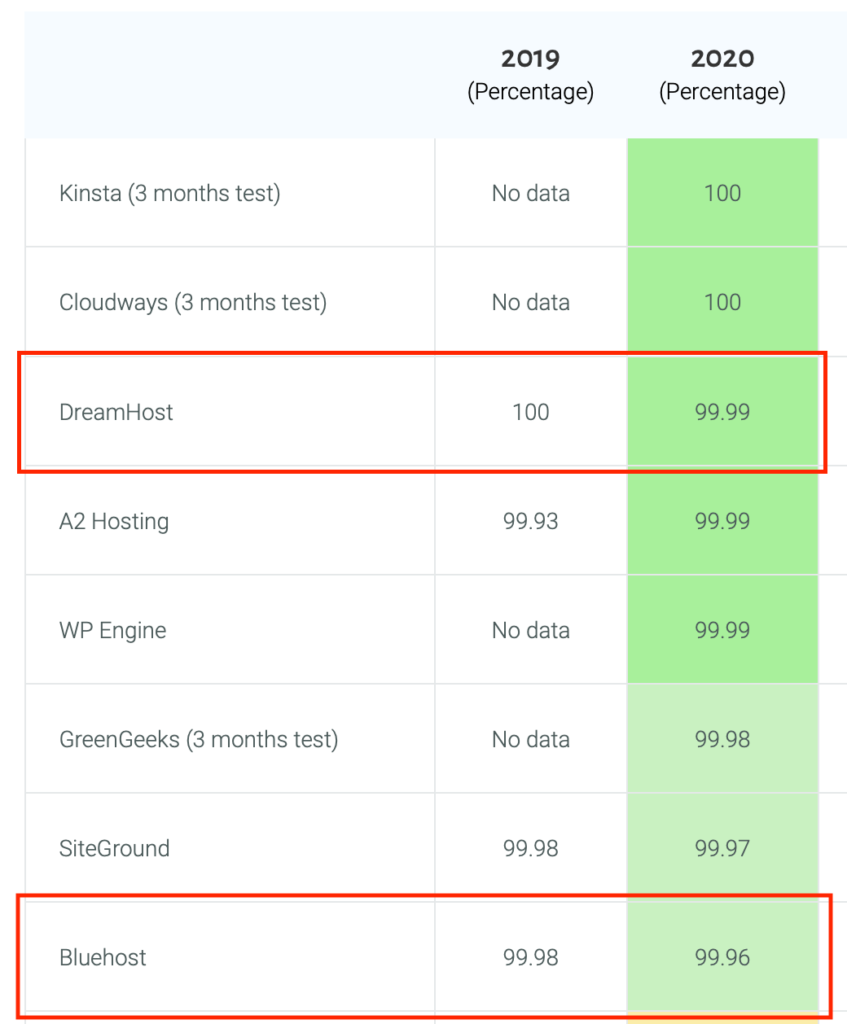
As you’ll see from the screenshot above, DreamHost has recorded an average of 99.99% uptime in 2020, while Bluehost recorded 99.96% uptime. Both are extremely acceptable, so when choosing between these two providers, site uptime is not a significant deciding factor.
Site Speed: DreamHost
Site speed is pretty darn crucial to the success of your business. Ever sat around waiting for a web page to load, gotten tired of waiting, and moved onto another product? Yeah, me too.
While there are many things that you can do to improve the speed of your site, if your host can’t serve every last one of your site’s pages in a heartbeat, it won’t matter what you do.
Google recommends that the longest it should take a website to load is 3 seconds. As you’ll see in the far-right column of the screenshot below, DreamHost clears this mark by 0.65 seconds, while Bluehost misses the mark by just 0.21 seconds.
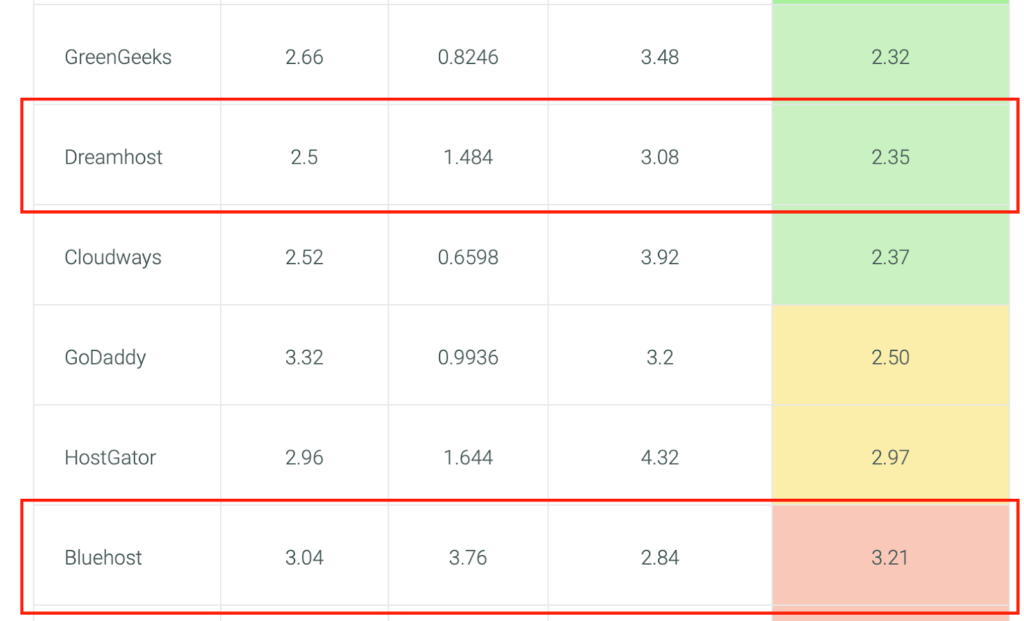
At the end of the day, DreamHost will load your page almost 1 second faster than Bluehost, and thereby, wins again.
It’s important to note that when you’re starting out, this may not be such a big deal to you. But as your business and website grow, this 1 second will become valuable.
Customer Support: Bluehost
Trust me, when it comes to building and running your own website, you need a good customer support team on your side.
Customer support can be extended in many ways such as online knowledge base, email, live chat, and of course, phone support. Ideally, your chosen host will offer all of these, but it will especially offer phone support as often as possible.
While DreamHost does have an extensive knowledge base and offers 24/7 support via email, if you want additional support over the phone, it’ll cost you an additional $9.95.
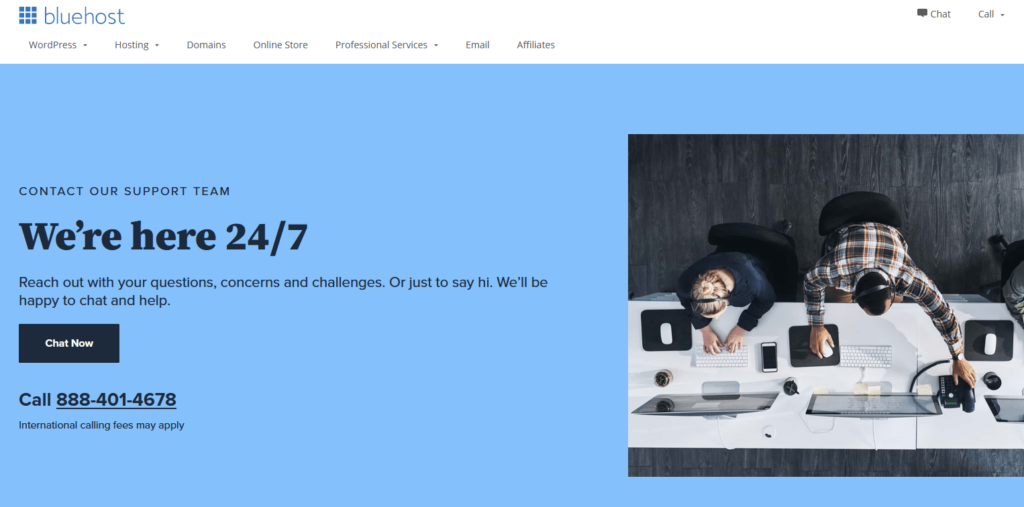
That’s why Bluehost takes the win in this area. Their customer support team is standing by 24/7 via phone and live chat support, without the additional price tag.
Traffic Volume: DreamHost
If you’re a beginner website owner, you may not yet understand the importance of the traffic volume limitations of your web hosting plan.
You see, if your website is new, it’s likely to only see a few hundred visitors per month. In this case, just about any web host will do the trick. But, as your business grows, you’re likely to start seeing a lot more traffic.
When your hosting plan has limitations on traffic volume, two things can happen.
You’ll lose the visitor when the website takes far too long to load or simply won’t let them in. And, you may be penalized financially by your host for overstepping your traffic limitations. Both are unsavory consequences.
So, when it comes down to who is the best here, DreamHost wins this round.
Bluehost simply provides an estimate of traffic limits, which when averaged out, boils down to about 600 visitors per hour. It’s still a lot! But not for those big-ticket websites that expect millions of visitors each month.
On the other hand, DreamHost allows unlimited traffic on all of their WordPress and Shared Hosting plans, meaning you’ll never have to worry about an unexpected traffic spike.
Price: DreamHost
Pricing plans can be a tricky thing to navigate. Almost every single host will offer a promotional price for a set period of time and this price will be as cheap as chips. However, after this period is over, the price will either rise moderately or shoot up exponentially.
That’s why we never recommend choosing a host on price alone. When you find a host who loves and supports you, the price becomes (mostly) irrelevant.
With that being said, we also want you to be wary of what you’re getting for said price. Most top hosts offer standard plans for $8-$20 per month. Any cheaper than this and you would want to do some serious research into the quality of the host.
For the purpose of this section, we are going to focus on the price of Bluehost and DreamHost’s 1-year Shared Hosting plans.
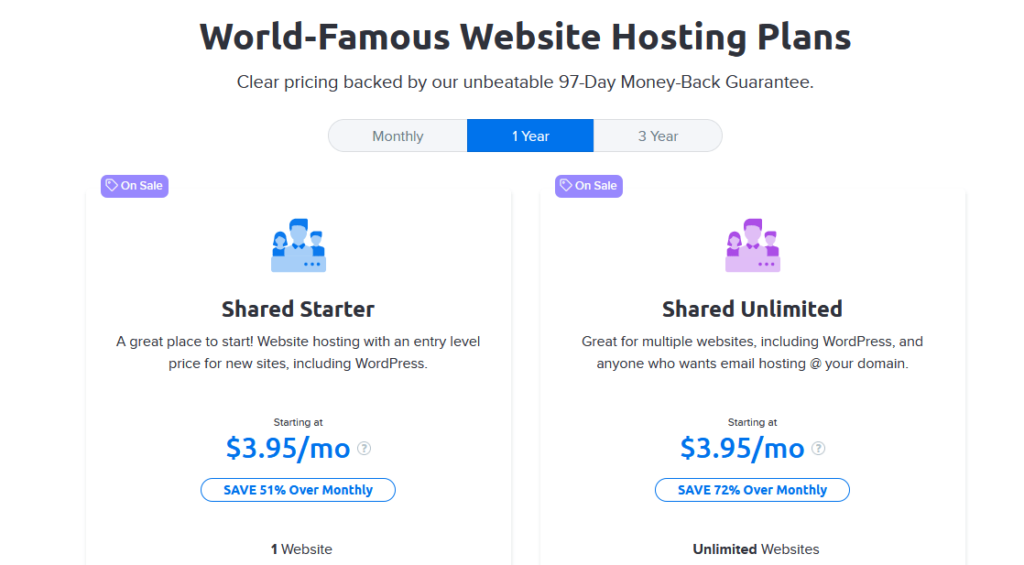
DreamHost’s Shared Starter plan starts off at $3.95 per month over a 12-month period. After the promotional period ends, the fee goes up to $6.99 per month. Furthermore, DreamHost also offers the option of no lock-in contracts, with a monthly payment of $7.99 per month. I don’t know of any other host that does this!
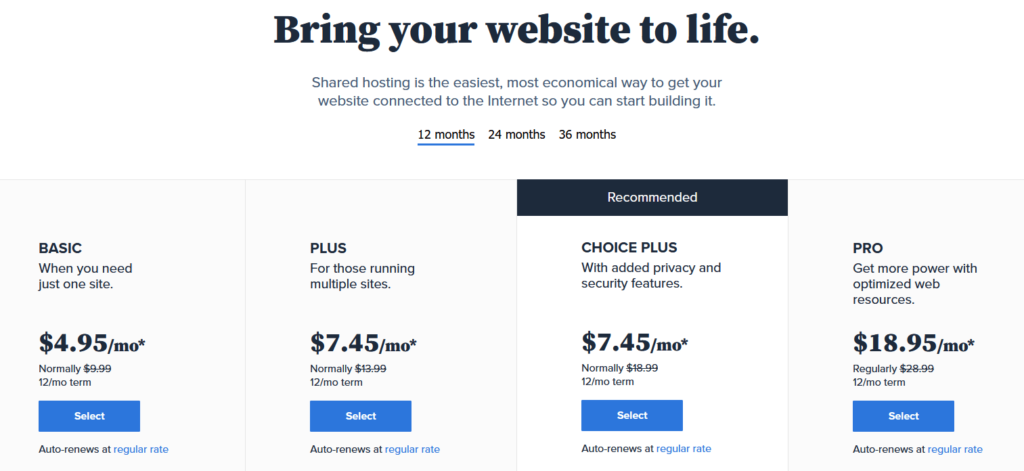
On the other hand, Bluehost’s Basic plan starts off at $4.95 per month over a 12-month period and renews at $9.99 at the end of the promotional period.
The difference between these two plans? Well, DreamHost offers unlimited traffic, free WordPress migrations, and WordPress pre-installed. Bluehost does not.
I think it’s clear who wins this round right? It’s DreamHost. The extra inclusions on the basic plan and the option to pay monthly for virtually the same as a 12-month lock-in contract are why it takes the cake.
Migration Features: DreamHost
Unless you’re a technology wizard, website migration is challenging for most. It can be made a little easier and straightforward. Or it can be a complete disaster ending in lost data, lost plugins, and lost settings, all of which spell disaster for you and your website.
With this in mind, it becomes a huge advantage when hosts offer a simple 1-click migration.
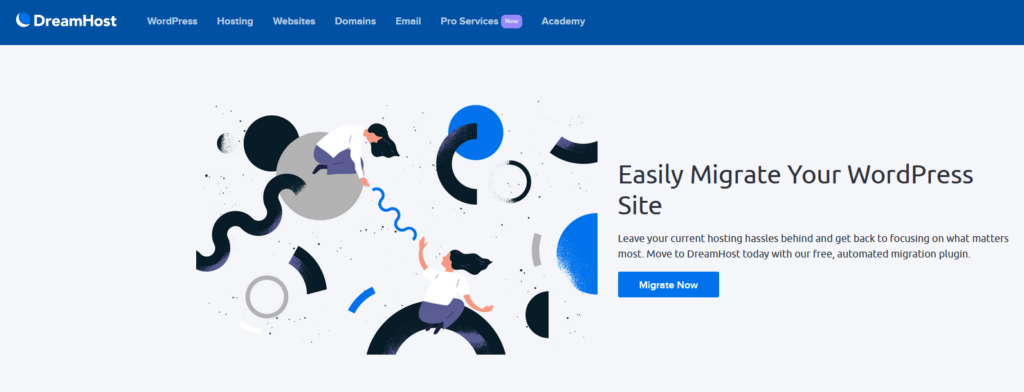
DreamHost plans offer free site migration via an automatic migration plugin which requires only a click of a button. They claim no downtime and no technical knowledge required. Although I’ve not used DreamHost’s plugin myself, my experience with other hosts of similar standards has been super easy and quick for small and medium-sized websites.
Now, Bluehost doesn’t advertise that they offer free migration unless you dig for it. Furthermore, you have to sign up for one of their plans before a team will evaluate whether or not your site qualifies for free migration. They assess criteria such as WordPress version, website and database size, current plugins, and so on.
If your site doesn’t qualify for free migration, Bluehost will reportedly charge you around $150 per website to do it for you. Ouch!
For most of us, a simple 1-click plugin will do the trick nicely. With this in mind, the winner once more is DreamHost.
Managed WordPress Hosting: DreamHost
Although both hosts provide standard WordPress hosting, I want to step outside the box a little and focus on their Managed WordPress hosting.

DreamHost cleverly markets their managed WordPress hosting as DreamPress and it’s designed to help your business grow. Some comparable key features of the DreamPress Basic plan include:
- Built for around 100k monthly visits
- Includes 30GB SSD storage
- Includes 1-Click staging
- Has on-demand and daily backups
- Free automated WordPress migrations
Where DreamHost falls down a little is their custom-built cPanel. It takes most users longer to master and lacks some advanced features that a regular cPanel includes. Furthermore, they only have available servers in the US, meaning it’s not really ideal to be running a website from faraway countries such as Australia.
Bluehost includes very similar features as the DreamHost plan. Let’s compare some of the key features mentioned above:
- Built for up to 50k monthly visits
- Includes only 20GB web storage
- Staging environment
- Daily scheduled backups
Bluehost does however include access to over 200 global edge servers, meaning you can run your website successfully from anywhere. What I also love about Bluehost is their dedicated marketplace with thousands of free and premium WordPress themes, outside of the ones on offer by WordPress.
But, unfortunately, in most areas of the plan they don’t quite meet the same standards as DreamHost. In particular when it comes to storage inclusion and visitor handling capabilities.
With this in mind, although both are great plans, I have to say that DreamHost nudges Bluehost out of a win.
Shared Hosting: Bluehost
Unless you’re managing a huge project or are a website whiz who wants to get your geek on with your server’s configuration, a shared hosting plan will do the trick for most. Think of it as sharing a flat. It’s cheaper than going out on your own, but it can be noisier and at times, more frustrating.
Let’s step away from the Basic plan and look at each host’s next tiered plan.

For Bluehost, this is the Plus plan, noted as best for those who need to run multiple websites. The regular price for this plan (outside of the promotional period) is $13.99 per month over 12 months. It includes:
- Unlimited websites
- Unlimited SSD storage
- Free domain (for 1 year)
- Free CDN and SSL certificate
- Free Office 365 – for 30 days
Furthermore, all of Bluehost’s plans, regardless of tier, include 24/7 phone support which is something that DreamHost doesn’t offer.
On the other hand, DreamHost offers the Shared Unlimited plan which is most comparable to Bluehost’s Plus plan. The price of this plan is usually $12.99 per month over 12 months, and includes:
- Unlimited websites
- Free domain (for 1 year)
- Unlimited traffic
- Fast SSD storage
- Free SSL certificate
- Unlimited domain-specific email addresses
The key benefits of this plan? Unlimited traffic and unlimited professional, domain-specific emails.
However, with two plans that are virtually the same price and include almost the same features, we need to come back to key basics like customer support.
Although they are cool features, the majority of new website users are not going to need unlimited traffic and unlimited domain-specific emails. What they are going to need is access to 24/7 customer support delivered via phone, live chat, and email.
Which is why the host with the best Shared Hosting plan is Bluehost.
VPS Hosting: DreamHost
Virtual Private Server (VPS) Hosting can be a good stepping stone for users who’ve outgrown their shared hosting plan but are not quite ready to step up to a Dedicated Hosting plan (which we’ll discuss shortly).
In a nutshell, VPS Hosting allows you to reduce the cost of your hosting by sharing the server with others but ensures a certain amount of resources such as RAM and CPU are dedicated to your account. It gives you greater certainty that your website will be able to handle high traffic volumes, regardless of what other users on your server are doing.
Both Bluehost and DreamHost offer a range of VPS Hosting plans, but again, for the purpose of comparing the two, we are going to focus on the Standard plans.
DreamHost really has two lead-in plans, one for new and small websites, and another for small businesses. I believe that it’s difficult to compare DreamHost with Bluehost ‘apples for apples’ in this category, as Bluehost’s Standard plan falls somewhere in between the two.
In any case, DreamHost’s VPS Basic Plan (ultimate lead-in) starts at $13.75 per month (12 months) and includes:
- 1 GB RAM
- 30 GB SSD storage
- Unlimited websites
- Unlimited traffic
- Unlimited bandwidth
If you find you’re growing quickly, you can scale the amount of RAM included in your plan quickly and effortlessly from within your VPS control panel.
On the other hand, Bluehost’s Standard VPS Hosting plan starts at $29.99 per month (outside promotional period priced at $18.99 per month) and includes:
- 2 GB RAM
- 30 GB SSD storage
- 1 TB bandwidth
- 1 IP address
So, at a glance, we can see that the two hosts offer similar features when it comes to their VPS Hosting plans. However, DreamHost consistently takes it a step further with their ‘unlimited’ offerings. We’re talking unlimited traffic, unlimited bandwidth, and unlimited websites.
It’s not to say that the Bluehost included limits won’t be enough for most, but when you can have unlimited anything, for fewer dollars per month, wouldn’t you want that?
I would. And that’s why DreamHost wins in my books when it comes to VPS Hosting plans.
Dedicated Hosting: Bluehost
Dedicated Hosting packages are ideal for large organizations or websites that want their very own dedicated server. Usually, these organizations would have high traffic volume and reap the benefits of having full control over their server by configuring it to meet their own needs.
If you’re not sure whether a Dedicated Hosting plan is for you, the easiest way to tell is whether or not you can understand some of the technical things we are about to talk about. If you can’t or don’t have someone on your team who can explain it to you, then it’s best to stick to a Shared or VPS Hosting option for now.
Both Bluehost and DreamHost offer Dedicated Hosting plans and for the purpose of comparing them side-by-side, we’re going to look at the Standard plans.
DreamHost’s Dedicated Hosting plan starts at $149 per month over a 12 month period and includes:
- Intel Xeon 4-Core 8-Thread
- 4GB RAM
- 1TB HDD storage
- Root access
- Local MySQL database server
- 24×7 tech support and server monitoring
The major thing that I want to point out here is that the 24×7 tech support is extended via email only. This does seem a bit crazy to me, but the inbox is truly monitored 24/7 by true tech experts who can solve a problem of any size. At least, that’s DreamHost’s guarantee.
Bluehost’s Dedicated Hosting plan starts at $119 per month over a 12 month period and includes:
- 4 cores @ 2.3 GHz
- 500GB (Mirrored) storage
- 4GB RAM
- 5TB Bandwidth
- 3 IP addresses
The main thing to highlight here is that Bluehost’s processing of 4 cores at 2.3 GHz actually makes it slightly more powerful than DreamHost’s 4-Core 8-Thread. However, Bluehost then lets itself down slightly with only 500GB of storage, compared to 1 TB offered by DreamHost.
Overall, I think Bluehost would edge DreamHost out of a win here for most people, but this one really comes down to what your individual needs are.
Domains: DreamHost
It’s no surprise that both Bluehost and DreamHost offer the option of securing your domain through them too. After all, all the top web hosting providers do!
The advantages of purchasing your domain through your web host are easy domain management and auto-renewal alongside your web hosting plan. You’ll keep all the important parts of your website in one place.
I’m not going to split Bluehost and DreamHost up here, as I have done in the previous sections, as they essentially offer the same things for their domain service. That is:
- Free private registration
- Easy domain transfer from another provider
- Domain forwarding
- Domain lock
You’ll also have a range of options to choose from when it comes to domain extension, rather than having to stick with the ole’ .com.
So, who is the better option then?

Well, DreamHost offers .com domains for $6.99 during the promotional period, with a renewal rate of $15.99 per year. They also offer the added feature of free and unlimited subdomains, which is a cool bonus that web hosts don’t often provide.
Bluehost offers .com domains for $12.99 during the promotional period, with a renewal rate of $17.99 per year (which I had to dig to find).
When it comes down to it, I would choose DreamHost as my domain provider. This is because they offer free and unlimited sub-domains and they are upfront about their pricing, always.
However, if I decided to use Bluehost for my web hosting, I’d do my domain through them too. It’s just easier to keep everything in one place and at the end of the day, the domain services are much the same.
Final Verdict
- Unlimited traffic
- Free one-click site migration
- Recommended by WordPress
- 97-day money back guarantee
When all is said and done, the best web host provider for most definitely goes to DreamHost.
They win on too many important aspects such as site uptime and speed, migration features, price, and plan inclusions, to not end up the better option. I also really appreciate that they are so upfront about their pricing. There are no hidden extras or surprise renewal rates with DreamHost.
That’s not to say that Bluehost isn’t a great provider, because they are. And we still recommend them as the best web host for beginners. That’s because their 24/7 phone support is so vital when you’re just starting out and you can’t get that from DreamHost.
If you’re still not sure if either of these hosts is for you, make sure you give our Top 10 Best Web Hosting Providers of 2021 review a read.



